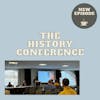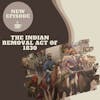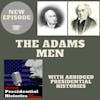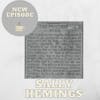The History Conference

The American Historical Association Conference was held last month in San Francisco. One of the largest conferences around, it attracts historians from all over to discuss and debate various historical topics. However, so much of the conference experience remains unknown.
Join me this week as I dive into history conferences. What are they? Should you go? And how can you maximize your experience?
There are a number of history conferences for you to choose from, here are some I've attended and recommend.
The American Historical Association National Conference
The Berks
The Society for Military History
Welcome to Civics and Coffee. My name is Alycia and I am a self-professed history nerd. Each week, I am going to chat about a topic on U.S history and give you both the highlights and occasionally break down some of the complexities in history; and share stories you may not remember learning in high school. All in the time it takes to enjoy a cup of coffee.
INTRO MUSIC
Hey everyone. Welcome back.
If you follow the podcast on social media then you are likely aware that I recently attended the American Historical Association conference in San Francisco. It is one of the largest gatherings of historians from across the country and is jam packed with historical tours, exhibits & panels.
The AHA, as it lovingly referred to, was not my first conference. That honor belongs to the Society For Military History which I attended in March of last year thanks to an invitation from a dear friend and fellow podcaster Philip Shackelford. Philip, who is the host of the Modern Scholar podcast, and has been a prior guest on this show, corralled a bunch of us podcasters together to share the benefits of podcasting to historians, the field of history, and everything in between. I posted the audio from that episode last year, so be sure to give it a listen if you haven’t already.
However, given the size of the AHA and the fact that it was being hosted in my backyard, I felt duty bound to head over and get a true taste of the mega conference experience. Plus conferences also mean access to ridiculously cheap books, so in my opinion everyone wins.
While sitting waiting for a panel over the weekend I was in a reflective mood and I thought I'd share an episode about conferences and what they can mean for podcasters, junior scholars, educators, and history nerds alike. This is a bit of a departure from my standard episode, however I think there is so much mystery around conferences that I hope you’ll forgive my detour.
So this week I am diving into the history conference. What are they? How do you navigate them? And should you consider going?
Grab your cup of coffee peeps. let's do this.
Before I dive into my experience with the AHA, I think it is important to provide some context and set the field, so to speak. History conferences ran the gamut from incredibly large, far ranging topics such as the AHA, to the tiniest of events with niche focus attended by just a handful of scholars and graduate students. If you are someone who is intimidated by the sight of thousands of people, I would recommend starting with something smaller.
Many large organizations have smaller, regional affiliates who host conferences every year. For example, the American Historical Association as a smaller subgroup, known as the Pacific Coast Branch, who is planning on hosting their conference in Hawaii this year. When I attended the Society for Military History’s conference in San Diego last year, I was incredibly nervous. If you listen regularly, you know I am the first one to admit I am not a military historian. Imagine the irony of going to your first history conference in a field you have largely avoided your entire academic career. No pressure.
I remember when I arrived at the SMH, I was terrified of making a bad impression. I was delightfully surprised to find that not only are military historians some of the nicest, most gracious people around, they nerd out just like anyone else. A special shout out to Dr. Heather Haley and Dr. Amy Rutenberg who were hands down some of the kindest women I’ve ever had the pleasure of meeting. While a significant conference, the SMH was mid-range when it came to attendees. There were people everywhere, for sure, but it did not feel too overwhelming and I will always have a special place in my heart for how they treated this conference rookie her first time through.
While smaller conferences feel a bit more intimate, they can be more economical and depending on where you live, may be easier to get to than a big national conference. I’ve also found that when I attended a smaller conference last summer, there were more opportunities to chat with incredible scholars who aren’t as jammed packed as they are during a larger event. Also, I recommend taking a look at what discounts they offer on pricing; usually teachers and students benefit from reduced rates and as I will gush about more shortly - enjoy access to some incredible books for a bargain.
So why should you consider going to a history conference besides the pure joy of being a nerd in your element? Well, there are several reasons. First, one of my favorite parts of the conference experience is getting a chance to meet what I consider to be celebrities. I have had the honor of introducing myself to, chatting with, and even getting books signed by esteemed scholars such as Dr. Linda Gordon, Dr. Annelise Orleck, and Dr. Einav Rabonvitch-Fox. They were all not only kind, but genuinely interested in what I was working on and only enhanced my conference experience.
One of the best parts of the conference is the ability to network. As both a graduate student and a podcaster, conferences are a great opportunity for me to get a sense of what people are working on and connect with scholars to come on to the show to discuss their work. There is also an opportunity to get your name out there for job placements. While the academy is struggling to keep positions, there are so many different avenues to explore including federal employment, book publishing, and working at a public history site that you learn more about while chatting people up in line for your morning coffee.
I also recommend going for the sheer knowledge you’ll gain from the various panels, roundtables, and plenary sessions. And while we’re doing conference talk, let me break down the difference for you so you know which session may meet your interest. Panels usually consist of a handful of scholars who have prepared papers - whether early drafts of future book chapters or the beginnings of a future article - that they will read out loud and take notes based on questions and feedback from the audience. A roundtable is more of a discussion, where scholars prepare brief remarks based on a shared theme and then chat and take questions from the audience, time permitting. Lastly, plenary sessions are usually what I call tentpole events - major moments of the conference where a majority of attendees are expected to attend such as the remarks from the president of the organization.
I am always inspired when I walk out of a session, even if I do not necessarily agree with everything presented or understand the details of what they discussed. It challenges me to consider a different perspective and reevaluate the assumptions I make about my own work and I wholeheartedly believe it makes me a better student of history.
And, of course, one of the absolute best parts of any conference experience are THE BOOKS. Even at the smallest of conferences, book publishers are everywhere giving discounts on amazing scholarship. You can enjoy deep discounts throughout the duration of the conference and if you are lucky enough to stay until the last day, can sometimes walk away with free titles. My husband is likely less excited about this than I am, and is probably very concerned about this means for the future of my already overfilled set of bookshelves, but hey - a girl has to do what she has to do. I did notice that themed conferences, like the SMH tend to tailor their book selections to the expected attendees, but even this non-military history nerd found some great books at SMH last year, so always take a look.
Hopefully I have talked you into heading to a history conference in the future. Before doing so, I have a few recommendations to help you maximize your experience. Oddly enough, just as I was putting together the bits for this episode, my pal Philip with the Modern Scholars podcast started a social media thread about ways to make the most of your conference experience as we are just about to enter peak conference season. So without further ado, I make the following recommendations.
Be sure to plan ahead - even at the smallest of conferences, the amount of sessions can be overwhelming and if you want until the day of, you may be less than prepared for how to get from panel to roundtable and back again. Most conferences these days either have an app or post their schedule a few weeks ahead of the conference. I recommend going through and selecting a few that sound interesting to you. And don’t worry if you like two sessions being hosted at the same time - save them both and make a game day decision. If you are going with a fellow history lover, see if you have any overlap in your preferred panels and split the work. While it won’t be the same as attending in person, you’ll still get a sense of the talk from your pal.
Planning ahead also includes any meet up you’d like to facilitate with a senior scholar or someone you do not know well. Sometimes people only fly in to present and have a short turnaround time, so reaching out in advance may help secure you some of their limited facetime.
For larger conferences, figure out if there are any auxiliary tours or events you’d like to participate in and reserve ahead of time, if needed. For the AHA in San Francisco, there were several walking tours provided and they all required signing up ahead of time and some came with an additional fee. So planning ahead remains essential.
If its your first time and the conference offers a welcome or intro session for new participants, consider going. While some of the information provided may feel basic, you’d be surprised at the little bits of information you pick up.
And this one goes without saying, but do not be afraid to introduce yourself to scholars you admire. I have made the awkward introduction, gushing endlessly - and quite inarticulately I might add - about how much I love someone and their work. Each and every time I’ve been received well and had wonderful conversations. However, I do want to put a little caveat to this and put a word of caution. Some people are easily intimidated and may be a little apprehensive. As a woman I know I am considered much less of a threat than perhaps even my husband, who would not bring harm to a fly - would be. And sometimes people are having an off day - be mindful of those non verbal queues and try not to take it personally if someone is a bit awkward at your approach. You never know what is happening for them beneath the surface.
This will make me sound like a broken record, but hit the book exhibit! In addition to the great discounts on books, there are usually lots of fun goodies, giveaways, and discounts on other items like journals. Plus sometimes you get free swag like reusable tote bags. I realize that is probably the most California sentence I will ever utter on this show. Forgive me.
If you’re up for it and are someone who enjoys the world wide web, follow the assigned hashtag on places like the former bird app for the event to see what cool stuff might be happening. While not completely glued to my hand when I am at a conference, I do make it a point to check in periodically to see what giveaways may be going on, where a reception is being held, or learn about a panel I may have missed while mapping out my schedule.
I also want to advocate for pacing yourself. It can be tempting to want to do all the things, visit all the places, and speak with all the people. Just try to remember the conference is a marathon, not a sprint. Most conferences last at least two days so you do not want to run yourself ragged on day one and have nothing left in the tank for subsequent days. Unless your Jason with the Historians At the Movies podcast who I do not think stopped once for the entire duration of the AHA, including hitting the gym in the morning like a true overachiever.
In the same vein as self-care, I recommend packing snacks and a reusable water bottle if you can. Conferences are generally hosted in major cities to allow for easy travel to and from the event, but it also means things get pricey quickly. Also, conference schedules do not lend themselves to much leisurely time if you hit all the sessions offered in a day. You generally get 20 to 30 minutes in between each one. On the surface, this may sound like a lot of time, but when you factor in getting from place to place - typically in a new environment where your nose is buried in a map or on your phone - 30 minutes gets drained quickly.
Now that I’ve outlined what to make sure you do, here are a few things I recommend you avoid.
Don’t try to be super spontaneous about your conference experience. You may miss out on interesting talks or events and even if you are a go with the flow type of person, perusing the schedule ahead of time will only help you once you arrive. If you can, do not miss the last day of the conference. I always feel bad for the people who are scheduled to present on the last day - they usually have to contend with minimal, if any, audience members and that is no way to end the conference. Also, I mentioned the whole book discount thing, right?
Finally, while your girl is all about the books, I feel duty bound to share the wisdom of my elders and give you the advice one of my professors shared with us graduate students ahead of the AHA: do not feel like you have to buy all the books at the conference. Publishers generally include a price list of the books they have on display. As my professor suggests, grab the price list and mark the books that interest you as you walk the booth. Then, once you are home and removed from the excitement of the conference, you can make your purchases, as conference discounts usually last for a few days after the conference. So, thank you, Professor Jolly, for that wonderful and money saving recommendation.
So there you have it, friends. All of your local podcasters reasons to go and ways to maximize your attendance. Before I sign off for the day, I want to gush just a bit about my time at the AHA. I walked away from the conference incredibly inspired and it was possible because of the people. Those who hosted, provided auxiliary support, presented papers, or helped people navigate the halls. To all the staff involved with the AHA - a big thank you. I also have to give a shout out to Kate Carpenter from Drafting the Past, Jason Herbert from Historians at the Movies, Dr. Hillary Green, Dr. Linda Gordon, and even Dr. Rachel Maddow who all took time to chat with me and elevated my conference experience. A big thanks as well to Jack from The History of the Americans podcast who I had a wonderful conversation with while sharing a cup of coffee. I think he even joked at the end of it, we actually shared a conversation about civics over coffee!
Finally, a huge California size level of thanks goes to my advisor, the esteemed Dr. Steve Estes. We got a chance to engage in a wonderful conversation about history, writing, and everything in between and it is something I will cherish until I am old and gray. Or.. rather, older and grayer.
And on that note, I end with: if you are a lover of history, whether an amateur like myself, or a practicing scholar, consider attending a conference. You will have an amazing time and I am willing to bet leave with a bit more inspiration than you had before you walked in.
Thanks, peeps. I’ll see you next week.
Thanks for tuning and I hope you enjoyed this episode of Civics & Coffee. If you want to hear more small snippets from american history, be sure to subscribe wherever you get your podcasts. Thanks for listening and I look forward to our next cup of coffee together.
OUTRO MUSIC
Listener Favorites
Not sure where to begin? Take a listen to some fan favorites.

























